CNH Industrial Bundle
Who Really Controls CNH Industrial?
Delving into CNH Industrial SWOT Analysis unveils more than just its market position; it reveals the very core of its operational strategy. Understanding the ownership structure of CNH Industrial is key to grasping its strategic direction and future potential. This global leader in capital goods, born from a significant merger, has a fascinating ownership story that impacts everything from innovation to market responsiveness.
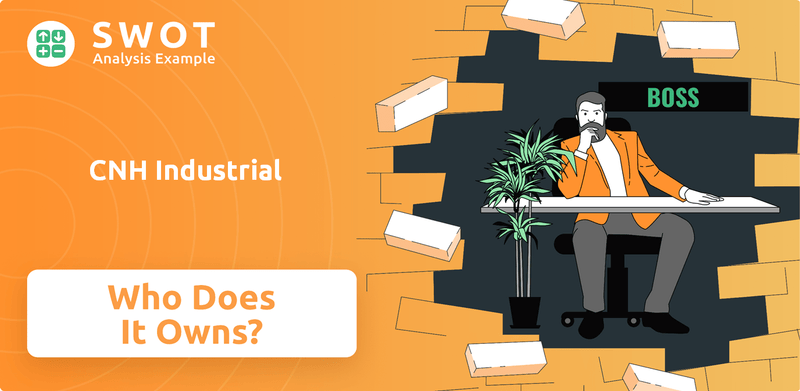
The journey of CNH Industrial, from its roots to its current status as a publicly traded entity, offers valuable insights into its decision-making processes. Knowing who owns CNH Industrial, including its major shareholders and the influence of its parent company, provides a clearer picture of its long-term vision. This exploration of CNH Industrial ownership will examine its historical evolution, current stakeholders, and the impact of these dynamics on its market performance and CNH Industrial stock.
Who Founded CNH Industrial?
The story of CNH Industrial's ownership is complex, rooted in a significant merger. It's less about a single founder and more about the evolution of ownership from its predecessor companies. Understanding who owns CNH Industrial involves looking at the entities that came together to create the company as it is known today.
At its core, CNH Industrial's formation was driven by the merger of Fiat Industrial S.p.A. and CNH Global N.V. in 2013. This merger reshaped the ownership landscape, bringing together various brands and their historical ownership structures. The primary influence on CNH Industrial ownership comes from its parent company, Exor N.V.
Exor N.V., the Agnelli family's holding company, has been the key player in shaping CNH Industrial's ownership. It's essential to recognize that while there isn't a single founder in the traditional sense, the Agnelli family, through Exor, has been instrumental in the company's formation and continues to hold a significant stake. The early ownership of the individual brands that now make up CNH Industrial, like Case and New Holland, traces back to their respective founders. However, the unified entity's ownership was defined by the share exchange during the 2013 merger.
Exor N.V. is the primary shareholder and the controlling entity of CNH Industrial.
The 2013 merger was crucial in establishing the current ownership structure of CNH Industrial.
The origins of CNH Industrial's brands can be traced back to the founders of companies like Case and New Holland.
The initial ownership structure was largely determined by the share exchange ratio during the 2013 merger.
The Agnelli family, through Exor, has maintained significant influence over CNH Industrial.
CNH Industrial is a publicly traded company, and its ownership is a mix of institutional and individual investors, with Exor N.V. holding the largest stake.
The ownership of CNH Industrial, therefore, is a blend of historical roots and the strategic decisions made during its formation. While the Agnelli family, through Exor N.V., holds a significant position, the company is also influenced by the broader market. For more details, you can read a Brief History of CNH Industrial.
The primary owner of CNH Industrial is Exor N.V., the Agnelli family's holding company.
- The 2013 merger was a pivotal event in shaping the current ownership structure.
- CNH Industrial is a publicly traded company, with Exor N.V. as the major shareholder.
- The historical roots of the company trace back to the founders of Case and New Holland.
- Understanding CNH Industrial ownership involves recognizing the influence of Exor N.V. and the impact of the merger.
CNH Industrial SWOT Analysis
- Complete SWOT Breakdown
- Fully Customizable
- Editable in Excel & Word
- Professional Formatting
- Investor-Ready Format
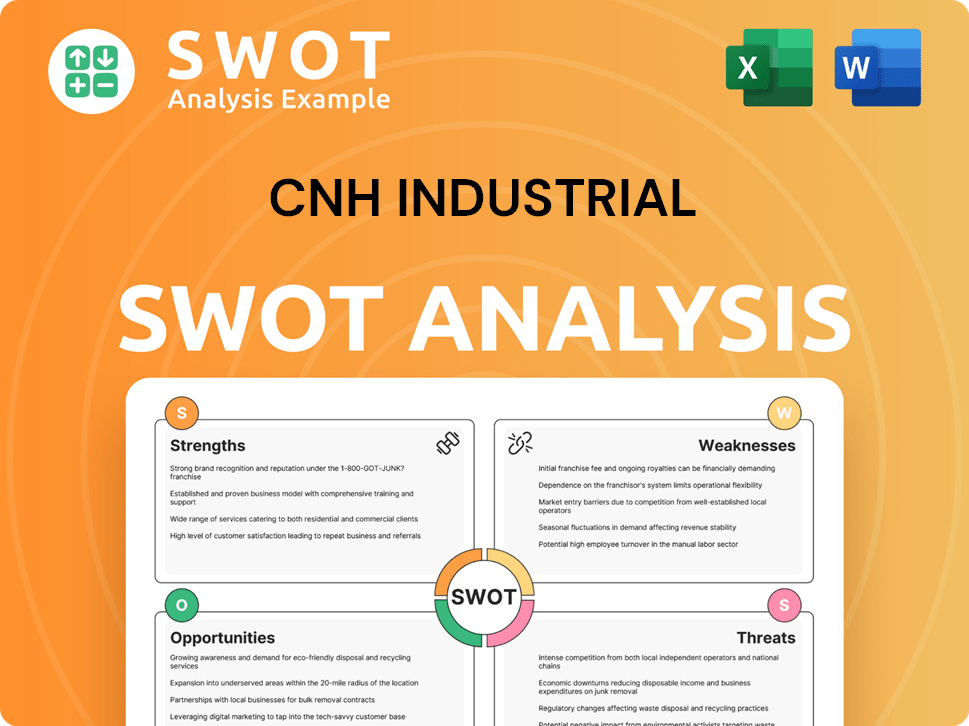
How Has CNH Industrial’s Ownership Changed Over Time?
The evolution of CNH Industrial's ownership structure has been marked by key events since its inception in 2013. The most pivotal change was the spin-off of its On-Highway business, Iveco Group, in January 2022. This strategic move allowed CNH Industrial to concentrate on its core Agricultural and Construction segments, reshaping its asset base and, consequently, influencing investor focus. This strategic restructuring has enabled the company to streamline operations and sharpen its focus on its primary business areas.
The primary stakeholder, Exor N.V., the diversified holding company of the Agnelli family, has maintained a significant influence. As of early 2025, Exor N.V. holds approximately 26.9% of the ordinary shares and 42.1% of the voting rights in CNH Industrial. This dual-class share structure grants Exor disproportionate control. Other major shareholders include institutional investors, mutual funds, and index funds, reflecting CNH Industrial's inclusion in major market indices.
| Shareholder | Approximate Stake (Early 2025) | Voting Rights (Early 2025) |
|---|---|---|
| Exor N.V. | 26.9% | 42.1% |
| The Vanguard Group (March 29, 2024) | Significant Passive Stake | N/A |
| BlackRock (March 29, 2024) | Significant Passive Stake | N/A |
The ownership of CNH Industrial is primarily controlled by Exor N.V., which holds a substantial percentage of both ordinary shares and voting rights. Other significant shareholders include institutional investors like The Vanguard Group and BlackRock. Understanding the Growth Strategy of CNH Industrial is crucial for investors. The company's focus on agricultural and construction equipment, along with its ownership structure, shapes its strategic direction and financial performance.
Exor N.V. remains the primary shareholder, wielding significant control.
- The spin-off of Iveco Group in 2022 reshaped the company's focus.
- Institutional investors hold significant passive stakes.
- The dual-class share structure grants Exor disproportionate voting power.
- CNH Industrial's strategic direction is heavily influenced by its major shareholders.
CNH Industrial PESTLE Analysis
- Covers All 6 PESTLE Categories
- No Research Needed – Save Hours of Work
- Built by Experts, Trusted by Consultants
- Instant Download, Ready to Use
- 100% Editable, Fully Customizable
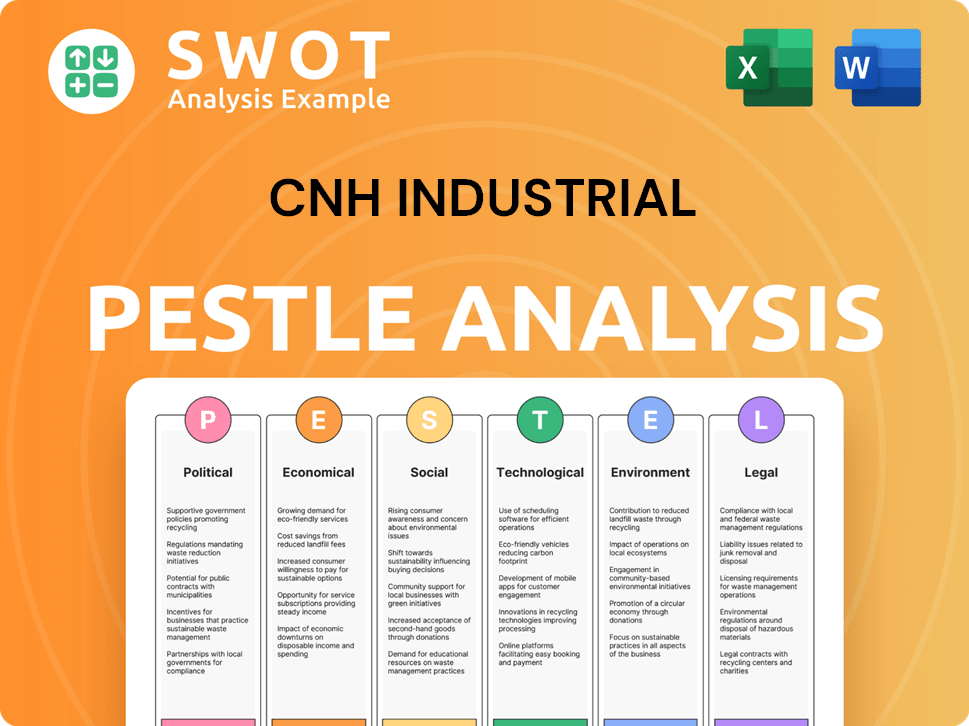
Who Sits on CNH Industrial’s Board?
The Board of Directors of CNH Industrial significantly influences the company's direction, reflecting the substantial impact of its primary shareholder. As of early 2025, the board includes several members, some directly representing or closely associated with Exor N.V., the major shareholder. Suzanne Heywood, the Chair of the Board, also serves as the Chief Operating Officer of Exor. This structure highlights the close alignment between the company's governance and the interests of its controlling shareholder.
The composition of the board is crucial for understanding the dynamics of CNH Industrial's governance. The presence of directors with ties to Exor, like Suzanne Heywood, underscores the influence of the parent company. While independent directors are also part of the board to ensure diverse perspectives and oversight, the significant presence of Exor-affiliated members reinforces the shareholder's influence over strategic decisions and executive appointments. This structure is a key aspect of understanding who controls CNH Industrial.
| Board Member | Role | Affiliation |
|---|---|---|
| Suzanne Heywood | Chair of the Board | Chief Operating Officer of Exor |
| Scott Wine | CEO | CNH Industrial |
| John Elkann | Director | Exor |
The voting structure at CNH Industrial incorporates a loyalty voting mechanism. Shares held continuously for at least three years are granted double voting rights. This mechanism significantly enhances Exor's control, as demonstrated by its 42.1% voting power with a 26.9% equity stake as of early 2025. This dual-class share structure effectively grants Exor outsized control over strategic decisions and executive appointments. The influence of the long-term, significant shareholders is reinforced by this structure. This is an important factor for anyone considering how to invest in CNH Industrial.
The Board of Directors is key to CNH Industrial's governance. Exor N.V. has significant influence due to its shareholding and board representation. The loyalty voting mechanism further concentrates voting power.
- Exor's influence is evident in board composition.
- Loyalty voting gives Exor enhanced control.
- Independent directors provide oversight.
- Understanding the company structure is essential.
CNH Industrial Business Model Canvas
- Complete 9-Block Business Model Canvas
- Effortlessly Communicate Your Business Strategy
- Investor-Ready BMC Format
- 100% Editable and Customizable
- Clear and Structured Layout
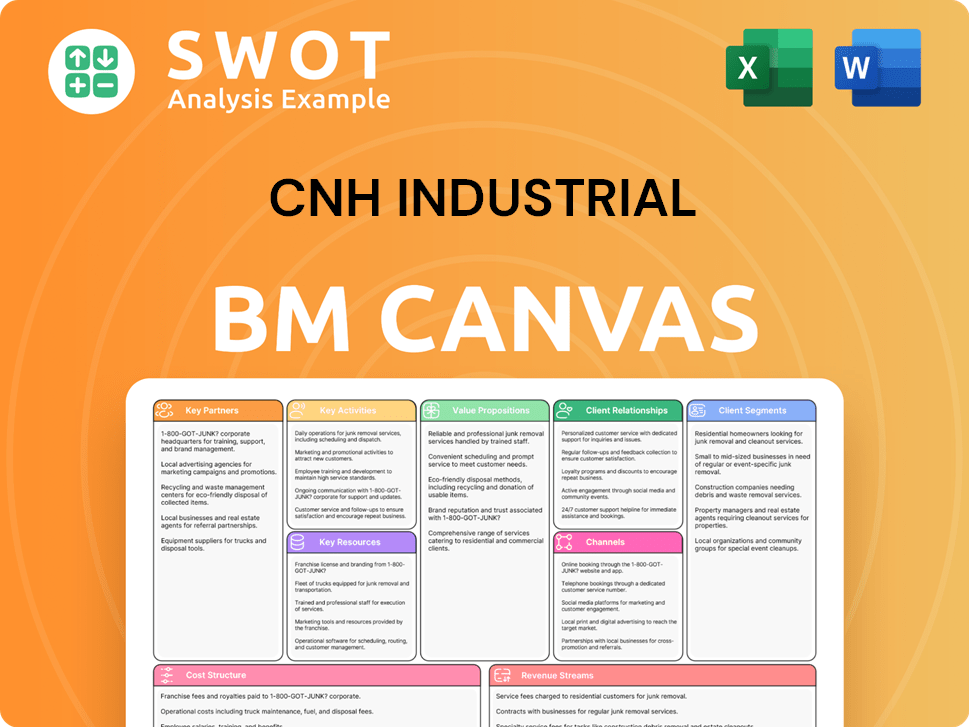
What Recent Changes Have Shaped CNH Industrial’s Ownership Landscape?
Over the past few years, the ownership structure of CNH Industrial has undergone significant changes. A pivotal event was the spin-off of the On-Highway business, which included Iveco, in January 2022. This strategic move resulted in two separate entities: CNH Industrial, focusing on agriculture and construction, and Iveco Group, concentrating on commercial vehicles. This restructuring aimed to unlock value and allow each entity to attract more focused investors. This has reshaped the shareholder base, with existing shareholders receiving shares in the newly formed Iveco Group.
Industry trends, particularly the increasing emphasis on sustainability and technology, also influence investor interest. CNH Industrial's investments in precision agriculture and alternative propulsion technologies have attracted investors interested in ESG (Environmental, Social, and Governance) compliant portfolios. The company's commitment to these areas has made it a more attractive investment for those prioritizing sustainable practices. Furthermore, the company has initiated share buyback programs, such as the multi-year $1 billion program started in 2024, which can consolidate ownership and potentially increase earnings per share. These actions reflect a dynamic ownership landscape.
| Metric | Value | Year |
|---|---|---|
| Market Capitalization (Approx.) | $18 billion | 2024 |
| Share Buyback Program | $1 billion | 2024 |
| Revenue (2023) | $24.7 billion | 2023 |
Exor N.V. remains the largest shareholder, reflecting a long-term commitment. Public statements and analyst reports suggest a continued focus on optimizing core segments and exploring strategic partnerships or acquisitions. These actions could further influence future ownership dynamics. For more insights into the company's operations, you can explore the Revenue Streams & Business Model of CNH Industrial.
The spin-off of Iveco Group in January 2022 significantly changed the ownership structure. This strategic decision allowed CNH Industrial to focus on its core agricultural and construction businesses. The move aimed to unlock value and attract more specialized investors.
Exor N.V. remains the largest shareholder, indicating a long-term investment perspective. Share buyback programs, like the $1 billion initiative in 2024, can consolidate ownership. The focus on ESG investments also influences ownership trends.
CNH Industrial is concentrating on precision agriculture and alternative propulsion technologies. This focus aims to attract investors interested in sustainability and technological innovation. These initiatives also align with broader industry trends.
The company may explore further strategic partnerships or acquisitions. These actions could strengthen CNH Industrial's market position. The evolving industry landscape will likely continue to shape ownership dynamics.
CNH Industrial Porter's Five Forces Analysis
- Covers All 5 Competitive Forces in Detail
- Structured for Consultants, Students, and Founders
- 100% Editable in Microsoft Word & Excel
- Instant Digital Download – Use Immediately
- Compatible with Mac & PC – Fully Unlocked
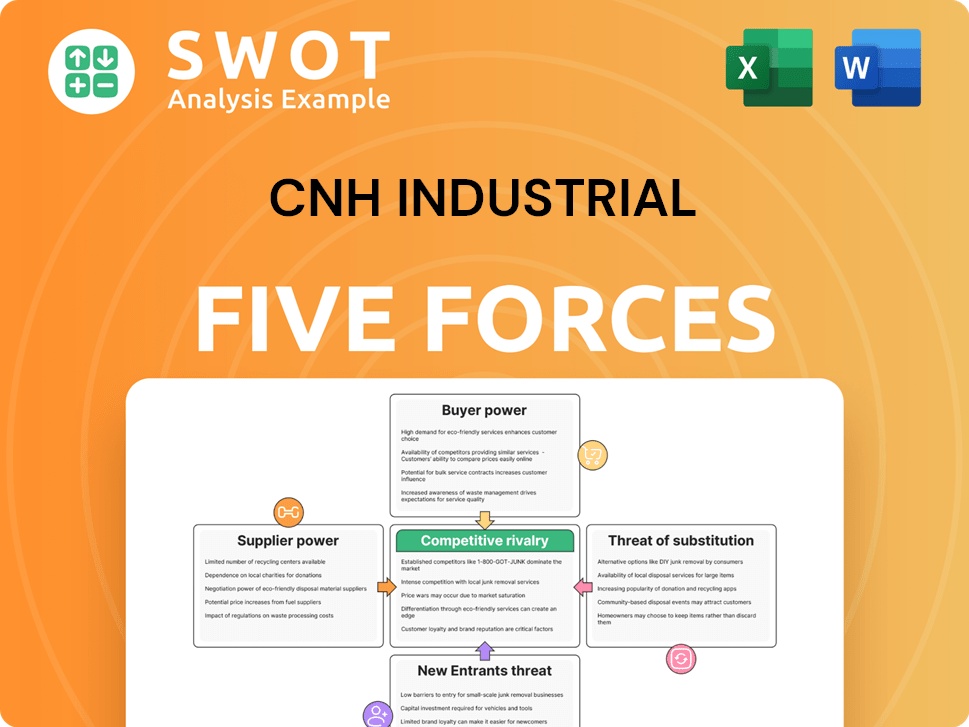
Related Blogs
- What are Mission Vision & Core Values of CNH Industrial Company?
- What is Competitive Landscape of CNH Industrial Company?
- What is Growth Strategy and Future Prospects of CNH Industrial Company?
- How Does CNH Industrial Company Work?
- What is Sales and Marketing Strategy of CNH Industrial Company?
- What is Brief History of CNH Industrial Company?
- What is Customer Demographics and Target Market of CNH Industrial Company?
Disclaimer
All information, articles, and product details provided on this website are for general informational and educational purposes only. We do not claim any ownership over, nor do we intend to infringe upon, any trademarks, copyrights, logos, brand names, or other intellectual property mentioned or depicted on this site. Such intellectual property remains the property of its respective owners, and any references here are made solely for identification or informational purposes, without implying any affiliation, endorsement, or partnership.
We make no representations or warranties, express or implied, regarding the accuracy, completeness, or suitability of any content or products presented. Nothing on this website should be construed as legal, tax, investment, financial, medical, or other professional advice. In addition, no part of this site—including articles or product references—constitutes a solicitation, recommendation, endorsement, advertisement, or offer to buy or sell any securities, franchises, or other financial instruments, particularly in jurisdictions where such activity would be unlawful.
All content is of a general nature and may not address the specific circumstances of any individual or entity. It is not a substitute for professional advice or services. Any actions you take based on the information provided here are strictly at your own risk. You accept full responsibility for any decisions or outcomes arising from your use of this website and agree to release us from any liability in connection with your use of, or reliance upon, the content or products found herein.